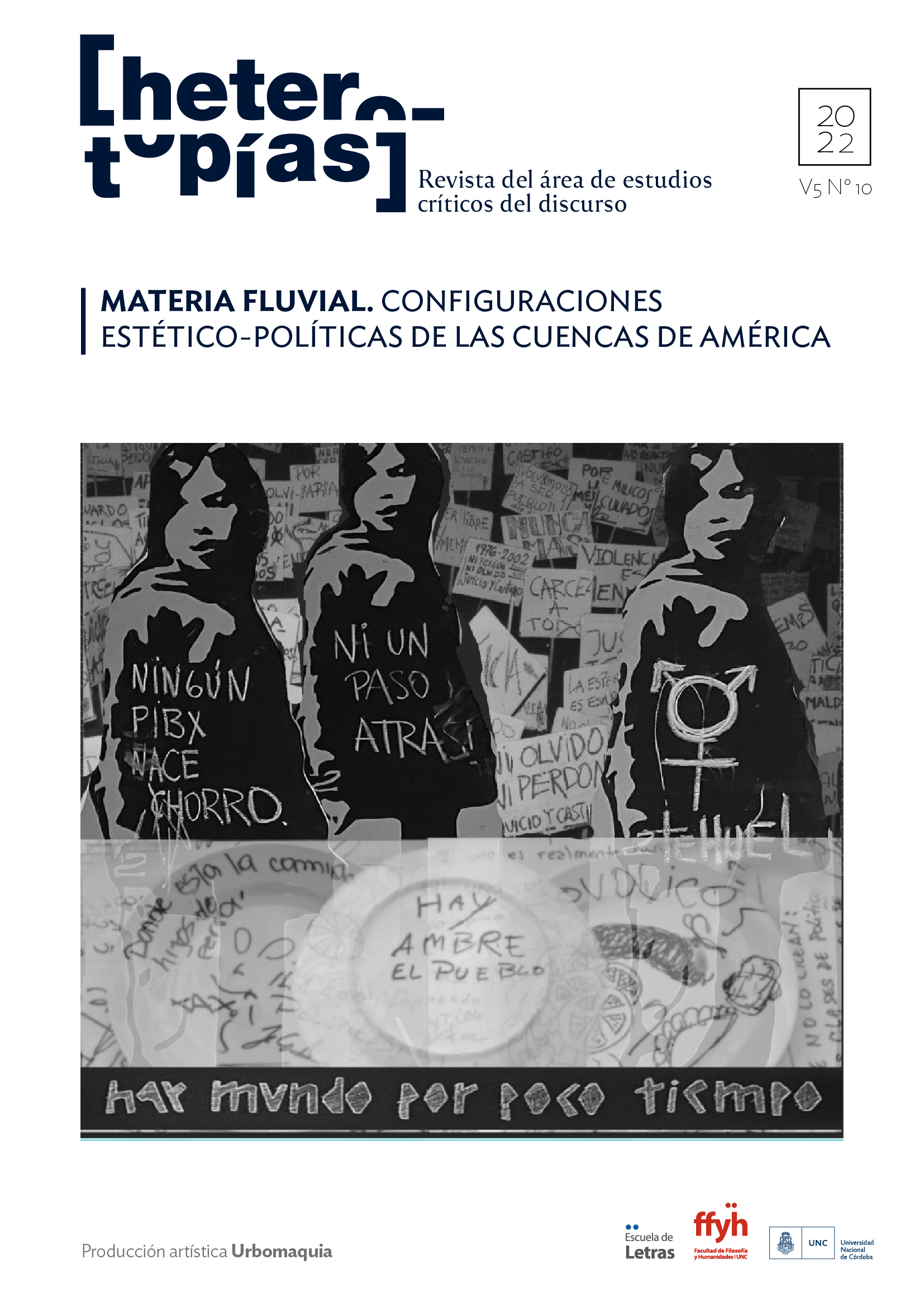Territorial flows and forms of community. Two short films and a fluvial expedition in the Argentina of the Bicentennial
Main Article Content
Abstract
This article proposes to triangulate the short films Nueva Argirópolis (2010) by Lucrecia Martel and Nómade (2010) by Pablo Trapero together with the Paraná R'angá Scientific-Cultural Expedition (Buenos Aires-Asunción, 2010), as philosophical and artistic essays that, around 2010, and mentioning three foundational moments (1567, 1810, 1850), assemble different temporalities through a montage of spaces: the hypothesis is that the incision of the story in the temporal folds of history implies in the three some ways of experiencing the territory, exposing ways of thinking (of imagining) forms of community. The article proposes to read, on the one hand, the fluvial reinscriptions of Sarmiento’s utopia (in Nueva Argirópolis, Paraná R'angá), and, on the other, the forms of the inaccessible and the non-place (that classic topic of the ethnographic journey) as powerful interventions in the context not only of the Bicentennial but also of the indigenous reemergence in the political and social scene of the last two decades (Nueva Argirópolis, Nómade).
Downloads
Article Details

This work is licensed under a Creative Commons Attribution-NonCommercial-ShareAlike 4.0 International License.
Those authors who have publications with this journal, accept the following terms: Those authors who have publications with this journal, accept the following terms:
a. The authors will keep their copyright and guarantee to the journal the right of first publication of their work, which will be simultaneously subject to the Creative Commons Attribution - Non-Commercial - Share Alike (by-nc-sa) Attribution License; no commercial use of the original work or any derivative works is allowed, the distribution of which must be done with a license equal to the one that regulates the original work.
b. Authors may adopt other non-exclusive license agreements for the distribution of the published version of the work (e.g., deposit it in an institutional telematic archive or publish it in a monographic volume) provided that the initial publication in this journal is indicated.
c. Authors are allowed and recommended to disseminate their work through the Internet (e.g. in institutional telematic archives or on their website) before and during the submission process, which may lead to interesting exchanges and increase the number of citations of the published work. (See The effect of open access).
References
Baczko, B. (1991). Los imaginarios sociales. Memorias y esperanzas colectivas. Buenos Aires, Argentina: Nueva Visión.
Bernabé, M. (2017). Por otro lado. Ensayos en el límite de la literatura, México: Consejo Editorial de la Administración Pública Estatal.
Bishop, C. (2010-2011). Performance delegada: subcontratar la autenticidad. En Otra parte, 22.
Buch, E. (1994). O juremos con gloria morir. Historia de una Épica de Estado. Buenos Aires, Argentina: Editorial Sudamericana.
Espósito, R. (2003). Communitas. Origen y destino de la comunidad. Buenos Aires, Argentina: Amorrortu.
Foucault, M. (2008). Utopías y heterotopías. En Topologías. Dos conferencias radiofónicas. Fractal, 48, enero-marzo.
García Helder, D., Moreno, M., Prieto, M. y Silvestri, G. (2011). Diario de bitácora. En Paraná R’angá. Un viaje filosófico. Rosario, Argentina: Centro Cultural Parque de España.
Lazzari, A. (2018). La reemergencia indígena en la Argentina: coordenadas y horizontes. En Voces en el Fénix, 8(72), 14-21.
Maccioni, F. (2019). El mismo río, dos veces. Repetición y recomienzo en Ulrico Schmidl y Paraná R’angá. En La Rocca, P. y Neuburger, A. Figuras de la intemperie. Panorama de estéticas contemporáneas. Córdoba, Argentina: Universidad Nacional de Córdoba.
Martel, L. (2010). La confederación de los ríos. En Radar, 3 de octubre.
Martin, D. (2016a). Lucrecia Martel’s Nueva Argirópolis: Rivers, Rumours and Resistance, July 2016. En Journal of Latin American Cultural Studies 25(3), 449-465.
Martin, D. (2016b). The cinema of Lucrecia Martel. Manchester, Inglaterra: Manchester University Press.
Moreno, M. (1 de julio de 2001). Siempre es difícil volver a casa. En Radar.
Nagy, M. y Papazian, A. (2011). El campo de concentración de Martín García. Entre el control estatal dentro de la isla y las prácticas de distribución de indígenas (1871-1886). En Corpus [En línea] 1(2).
Silvestri, G. (ed.) y Prieto, M. (dir.). (2011). Paraná R’angá. Un viaje filosófico. Rosario, Argentina: Centro Cultural Parque de España.
Sarmiento, D. F. (1948) [1850]. Argirópolis. O la capital de los Estados Confederados del Río de la Plata. Buenos Aires, Argentina: Eudeba.
Sarmiento, D. F. (1899). El Carapachay. En Obras de Domingo F. Sarmiento. Tomo XXVI. El camino del Lacio. Buenos Aires, Argentina: A. Belin Sarmiento editor.
Silvestri, G. (2011a). La historia de una idea. En Paraná R’angá. Un viaje filosófico. Rosario, Argentina: Centro Cultural Parque de España.
Silvestri, G. (2011b). Fronteras porosas, tecnologías móviles y Estados burocráticos. Comentarios sobre los proyectos de Mariana Oeyén y Solano Benitez. En Paraná R’angá. Un viaje filosófico. Rosario, Argentina: Centro Cultural Parque de España.
Simmel, G. (2010). El secreto y las sociedades secretas. Buenos Aires, Argentina: Editorial Sequitur.
Villavicencio, S. (2010). Argirópolis: territorio, república y utopía en la fundación de la nación. En Revista Pilquen, 12, ene./jun.
